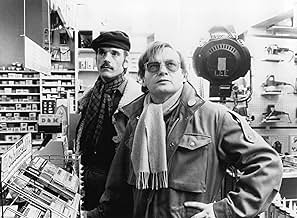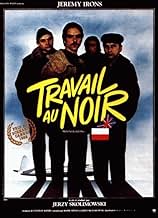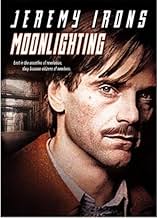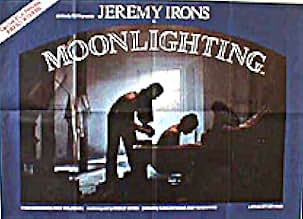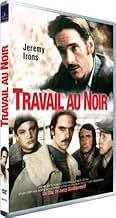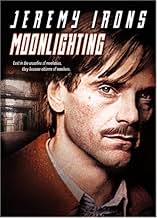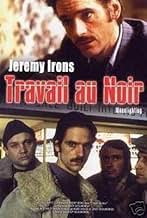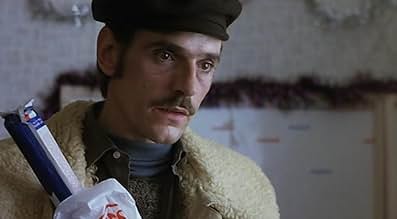IMDb-BEWERTUNG
7,3/10
3725
IHRE BEWERTUNG
Drei polnische Maurer und ihr Vorarbeiter Novak kommen nach London, um unter dem Tisch zu arbeiten.Drei polnische Maurer und ihr Vorarbeiter Novak kommen nach London, um unter dem Tisch zu arbeiten.Drei polnische Maurer und ihr Vorarbeiter Novak kommen nach London, um unter dem Tisch zu arbeiten.
- Regie
- Drehbuch
- Hauptbesetzung
- Auszeichnungen
- 3 Gewinne & 3 Nominierungen insgesamt
Jiri Stanislav
- Wolski
- (as Jirí Stanislav)
Michael Sarne
- Builders' Merchant
- (as Mike Sarne)
Empfohlene Bewertungen
I was in my teens in the early 1980's when this story takes place, and we were going through hell in my country. But by all accounts, Britain was not really a paradise in the 80's either. You can feel that in every frame, every line of dialogue.
A bunch of Polish builders arrive in London to renovate a house belonging to their boss. The foreman, Nowak, played quietly and brilliantly by Jeremy Irons, is the only one that speaks English. Their money is sufficient only for the tools, building materials and barely surviving.
This is a slow-burner film with every face hiding a deep anxiety, anger or fear, it's a wonderful experience for those who can appreciate true cinema. Irons carries the film single-handedly (often with inner monologue, since there are not many people to talk to) with few facial expressions but each one telling books of emotions.
You can literally taste the frustration of every character: the builders, working hard but not able to enjoy the western life that they finally see but cannot touch, are angry. (There's a very funny scene where one of them wants to buy Coca Cola on their first trip to the supermarket, exclaiming "Coke!" with childish glee, but their money is so limited that they can't afford even that.) The neighbors are angry, because the builders make too much noise. Most of all, Nowak is angry for a lot of reasons, although he never shows it: He misses his wife, and has growing doubts about the intentions of his boss about her. He speaks English, but doesn't always understand the subtleties of what the British people say. He has to deal with the men, the meager finances, the neighbors, the skip workers, and of course the house itself, which looks like it will come down if someone sneezes hard.
Two things change the course of their dull days dramatically: the money obviously won't last, and Nowak starts to come up with little schemes to get extra food from the supermarket using the same receipt. He's quite inept, but lady luck is often on his side. But most importantly, he hears that a military coup has taken place in his homeland. He faces a terrible dilemma: does he tell the men? He must, since they all have families at home, but then the work will never finish, and they really need the income. (There's no way they'll be allowed back, anyway) Or does he not tell them? Then the work may finish on time, but how will he keep the men from finding out themselves, when their weekly phone calls from home suddenly stop?
It's basically a hero story. What's a hero? A Marvel guy in leotards, speaking in one-liners? Or a man who does the right thing, at his own cost, knowing that he will never be appreciated? Nowak does the right thing. He hides the truth about the coup, thus keeping the men from rushing to the border and probably getting arrested. He gets the work done on time. He sees attractive women, but never chases them: they only remind him of how much he loves and misses his wife. He steals, but not from regular people: he only steals from the supermarket, and steals food and basic necessities only. And all the while he keeps his mouth shut. He doesn't "share his journey" or any other nonsensical stuff we love oh so much nowadays. He doesn't expect rewards, admiration, medals, approval, praise. He does the right thing, because he's a man, and that's what a man does. Even the final scene, where he tells the men about the coup and gets beaten by them for hiding the truth so long, is a tribute to this: He doesn't try to justify it, he knows he did the right thing but also hurt his men, so he takes their punches like a man.
As one other reviewer mentioned, it's a movie for the discerning viewer. There's nothing wrong with Marvel movies or action movies, but there's a lot wrong with thinking that's what movies are all about.
A bunch of Polish builders arrive in London to renovate a house belonging to their boss. The foreman, Nowak, played quietly and brilliantly by Jeremy Irons, is the only one that speaks English. Their money is sufficient only for the tools, building materials and barely surviving.
This is a slow-burner film with every face hiding a deep anxiety, anger or fear, it's a wonderful experience for those who can appreciate true cinema. Irons carries the film single-handedly (often with inner monologue, since there are not many people to talk to) with few facial expressions but each one telling books of emotions.
You can literally taste the frustration of every character: the builders, working hard but not able to enjoy the western life that they finally see but cannot touch, are angry. (There's a very funny scene where one of them wants to buy Coca Cola on their first trip to the supermarket, exclaiming "Coke!" with childish glee, but their money is so limited that they can't afford even that.) The neighbors are angry, because the builders make too much noise. Most of all, Nowak is angry for a lot of reasons, although he never shows it: He misses his wife, and has growing doubts about the intentions of his boss about her. He speaks English, but doesn't always understand the subtleties of what the British people say. He has to deal with the men, the meager finances, the neighbors, the skip workers, and of course the house itself, which looks like it will come down if someone sneezes hard.
Two things change the course of their dull days dramatically: the money obviously won't last, and Nowak starts to come up with little schemes to get extra food from the supermarket using the same receipt. He's quite inept, but lady luck is often on his side. But most importantly, he hears that a military coup has taken place in his homeland. He faces a terrible dilemma: does he tell the men? He must, since they all have families at home, but then the work will never finish, and they really need the income. (There's no way they'll be allowed back, anyway) Or does he not tell them? Then the work may finish on time, but how will he keep the men from finding out themselves, when their weekly phone calls from home suddenly stop?
It's basically a hero story. What's a hero? A Marvel guy in leotards, speaking in one-liners? Or a man who does the right thing, at his own cost, knowing that he will never be appreciated? Nowak does the right thing. He hides the truth about the coup, thus keeping the men from rushing to the border and probably getting arrested. He gets the work done on time. He sees attractive women, but never chases them: they only remind him of how much he loves and misses his wife. He steals, but not from regular people: he only steals from the supermarket, and steals food and basic necessities only. And all the while he keeps his mouth shut. He doesn't "share his journey" or any other nonsensical stuff we love oh so much nowadays. He doesn't expect rewards, admiration, medals, approval, praise. He does the right thing, because he's a man, and that's what a man does. Even the final scene, where he tells the men about the coup and gets beaten by them for hiding the truth so long, is a tribute to this: He doesn't try to justify it, he knows he did the right thing but also hurt his men, so he takes their punches like a man.
As one other reviewer mentioned, it's a movie for the discerning viewer. There's nothing wrong with Marvel movies or action movies, but there's a lot wrong with thinking that's what movies are all about.
The story is told by Novak's point of view. Jeremy Irons learns his Polish to play Novak in this story. He is a Polish electrician traveling with three other works to London, England before martial law was enacted in Poland in 1981. Well, anyway as a Polish American, they are believable but are seen as buffoonish and dumb even by Novak himself. If Novak had told his workers the truth, I think they would have gotten along or understood their dire consequences. Jeremy Irons gives a pretty believable performance as the working Polishman. This film resonates a quarter of a century later because many Polish men and women are legally in London and England seeking to better themselves. I understand the Polish mentality because I grew up with Polish immigrants and the notion of Poles coming just to work and earn more money in America. I could see this story actually happening but I don't think they give the other workers credit because we barely see them act as anything other than fools. It's kind of heartbreaking because Novak goes to so much trouble to spare them from the lack of money and the truth of the situation back home in Poland where he is the only one who knows only what's going on but doesn't tell his employees under his command that Poland is in political turmoil. You can't help but wonder what happens when they do go home. Can you imagine walking 6 hours to Heathrow Airport? You felt pity and foolishness for Novak's actions at the supermarket and the stores. Of course, Poles are good at surviving and I know this from my personal experience. They have survived 2 World Wars and communism. Poles' biggest problem is living and to stop worrying about money. The stereotypes of Poles like Novak trying to stretch each pence is to survive nothing more. They didn't complain about the 30 miles to Heathrow. You felt that they were out of place there. Novak wondered about his wife, Anna, and the possibility that she was probably being seduced by his employer who sent him to London in the first place to fix up the apartment. With telephone services cut down and money tight, Novak does everything he can to protect himself and his men from the dangers of the police, immigration, and even Polish government under martial law. We don't know what happens to them when they go home or if they ever do or if they are stranded in London. There are still many unanswered questions about their predicament.
Led by Nowak, the only member of the group with minimal English skills, four Polish contractors arrive in London to gut and refurbish a row house that belongs to their boss back in Warsaw. Heavily laden with tools and carrying only enough cash for materials, bare living expenses, and little entertainment, the four face separation from family and an often hostile English environment. However, the money earned will go a long way in Poland, and their boss will have a renovated London flat at a quarter the cost of using English labor.
Written and directed by Polish playwright Jerzy Skolimowski, "Moonlighting" is a low key film that focuses on the interaction among the four isolated men, who live, work, and sleep in the flat. Nowak, Jeremy Irons in a quiet understated performance, is the only one to regularly venture outside to find food and building materials. Faced with dwindling funds, Nowak devises various methods to shoplift goods or outwit store managers and cleverly double his grocery purchases. While sheer luck often aids Nowak with his dodgy schemes, the English shopkeepers seem remarkably dim, and the immigration officer on arrival at Heathrow was unbelievably gullible.
The story takes place in 1981, the year the film was shot, and, while Nowak struggles with finances and an approaching deadline, Poland stumbles into a military coup, and martial law is imposed. With phone lines cut between London and Warsaw and all flights to Poland canceled, Nowak must conceal the events unfolding at home from his compatriots to keep them focused on finishing the flat. Because three of the four principal actors have few lines and those only in Polish, the film concentrates on Irons, who ably carries the film. Although much of the action takes place inside the flat, Skolimowski's direction manages to avoid a claustrophobic feel. However, "Moonlighting's" leisurely pace does require patience. But Nowak's sharp wits and audacity, fueled by his determination to complete the assigned task despite the mounting odds, make for engrossing viewing. Skolimowski's "Moonlighting" is a small, overlooked film with many rewards for discerning viewers to discover.
Written and directed by Polish playwright Jerzy Skolimowski, "Moonlighting" is a low key film that focuses on the interaction among the four isolated men, who live, work, and sleep in the flat. Nowak, Jeremy Irons in a quiet understated performance, is the only one to regularly venture outside to find food and building materials. Faced with dwindling funds, Nowak devises various methods to shoplift goods or outwit store managers and cleverly double his grocery purchases. While sheer luck often aids Nowak with his dodgy schemes, the English shopkeepers seem remarkably dim, and the immigration officer on arrival at Heathrow was unbelievably gullible.
The story takes place in 1981, the year the film was shot, and, while Nowak struggles with finances and an approaching deadline, Poland stumbles into a military coup, and martial law is imposed. With phone lines cut between London and Warsaw and all flights to Poland canceled, Nowak must conceal the events unfolding at home from his compatriots to keep them focused on finishing the flat. Because three of the four principal actors have few lines and those only in Polish, the film concentrates on Irons, who ably carries the film. Although much of the action takes place inside the flat, Skolimowski's direction manages to avoid a claustrophobic feel. However, "Moonlighting's" leisurely pace does require patience. But Nowak's sharp wits and audacity, fueled by his determination to complete the assigned task despite the mounting odds, make for engrossing viewing. Skolimowski's "Moonlighting" is a small, overlooked film with many rewards for discerning viewers to discover.
I noticed some time ago that many of the old "At the Movies" shows with Siskel and Ebert are posted on YouTube. Today I watched their Best of 1982 episode and was surprised that Gene Siskel thought "Moonlighting" was the best movie of the year...a film I'd never heard of and which was made very cheaply in the UK. So, I decided to give it a watch.
The story is about four Poles who come to London to work under the table rehabbing an apartment. Why? Well, Polish workers work for a lot less money than English ones and as long as they aren't caught, the scheme will pay off well for everyone. But only one of them (Jeremy Irons) speaks English and the rest spend much of the movie like the Darryls ("Newhart") or Harpo Marx...saying absolutely nothing. As the movie progresses, the more you see that this spokesman is very manipulative...and a most unusual character study of the man.
The story is told VERY economically...with little traditional incidental music and no fancy sets. It looks more like a high quality home movie than a big-time production. I am sure many will dislike the starkness and slow pace of the movie as well as the lack of emotion in the characters. They mostly seem depressed...which is understandable considering what eventually occurs in the picture. But it also makes viewing the film anything but fun.
Overall, this is an okay film which I didn't enjoy nearly as much as Siskel or some of the other reviewers did. Worth seeing? Perhaps...but not if you want a fun or traditional style movie.
The story is about four Poles who come to London to work under the table rehabbing an apartment. Why? Well, Polish workers work for a lot less money than English ones and as long as they aren't caught, the scheme will pay off well for everyone. But only one of them (Jeremy Irons) speaks English and the rest spend much of the movie like the Darryls ("Newhart") or Harpo Marx...saying absolutely nothing. As the movie progresses, the more you see that this spokesman is very manipulative...and a most unusual character study of the man.
The story is told VERY economically...with little traditional incidental music and no fancy sets. It looks more like a high quality home movie than a big-time production. I am sure many will dislike the starkness and slow pace of the movie as well as the lack of emotion in the characters. They mostly seem depressed...which is understandable considering what eventually occurs in the picture. But it also makes viewing the film anything but fun.
Overall, this is an okay film which I didn't enjoy nearly as much as Siskel or some of the other reviewers did. Worth seeing? Perhaps...but not if you want a fun or traditional style movie.
This film is a mesmerizing and strangely addictive story about a man who buys a dilapidated condo in London and hires and transports several Polish builders to London to renovate it because they will work for a cheaper amount than the unionized English workers. Except for the foreman (in an early role by Jeremy Irons) none of them speak English and the foreman doesn't tell his employer or his co- workers when they overshoot the budget and run out of money.
Trying to figure out HOW he will get the job done and WHY he is going to such great lengths and pains becomes all consuming mental and emotional puzzles as you become sucked into this well written story and tour de force performance by Jeremy Irons. By the second half of the film, you can't bare to watch but can't stand to look away. (It's as if you meant to eat only a few peanuts to suddenly discover you've consumed the entire amount and didn't even notice) I think this film is best described as "Escapism" rather than "Enjoyment" but either way you won't be focused on anything else while you're watching it. In fact the "taste" of it lingered with me for days after I saw it. It's full of a quiet yet constantly building tension, with a capital 'T'. No car chases, big explosions, explicit sex, swearing or violence. Just a well constructed screen gem that seemed to have fallen through the cracks when it was released in the early 1980's.
Trying to figure out HOW he will get the job done and WHY he is going to such great lengths and pains becomes all consuming mental and emotional puzzles as you become sucked into this well written story and tour de force performance by Jeremy Irons. By the second half of the film, you can't bare to watch but can't stand to look away. (It's as if you meant to eat only a few peanuts to suddenly discover you've consumed the entire amount and didn't even notice) I think this film is best described as "Escapism" rather than "Enjoyment" but either way you won't be focused on anything else while you're watching it. In fact the "taste" of it lingered with me for days after I saw it. It's full of a quiet yet constantly building tension, with a capital 'T'. No car chases, big explosions, explicit sex, swearing or violence. Just a well constructed screen gem that seemed to have fallen through the cracks when it was released in the early 1980's.
Wusstest du schon
- WissenswertesSkolimowski's Kensington house in West London was in real life undergoing renovation at the time the film was made. (Moonligthing, 1982)
- PatzerWhen one of the workers paints the door frame on the outside of the building and clears away the electrical wire, part of the lintel is already painted white. Later, when Banaszak climbs up the ladder, the lintel has not yet been painted. Then, in the close-up in which he gets the electric shock, a good part of the lintel is painted white again, and in the next shot, when he falls off the ladder, only a tiny part is painted white again.
- VerbindungenFeatured in At the Movies: The Best Films of 1982 (1983)
Top-Auswahl
Melde dich zum Bewerten an und greife auf die Watchlist für personalisierte Empfehlungen zu.
- How long is Moonlighting?Powered by Alexa
Details
- Erscheinungsdatum
- Herkunftsland
- Sprachen
- Auch bekannt als
- Moonlighting
- Drehorte
- Produktionsfirmen
- Weitere beteiligte Unternehmen bei IMDbPro anzeigen
Zu dieser Seite beitragen
Bearbeitung vorschlagen oder fehlenden Inhalt hinzufügen


